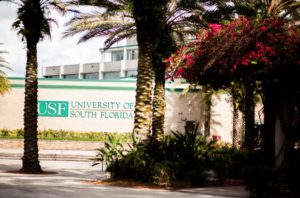SGEF funding up in the air amid consolidation

With consolidation going into effect on July 1, 2020, the Student Green Energy Fund (SGEF) committee is filled with unanswered questions and uncertainties regarding the future of the fee on all three campuses.
However, the focus to spread awareness of the fee to students still remains a priority.
As of last year’s fiscal year, each student at the Tampa and St. Pete locations pay $1 per credit hour. At Sarasota-Manatee a fee has not been established.
Out of the 813-page Consolidation Implementation Plan and Timeline report, SGEF is mentioned once by David Thompson, a former USF St. Petersburg student body president, about SG’s “authority to finance and support clubs and organizations, as well CITF, SGEF and student fees based out of the St. Petersburg campus,” according to the document.
Adam Matern, SG associate justice, has been involved in the SGEF committee for the past year and highlighted the sense of urgency regarding consolidation and the SGEF across all three campuses.
“I’ve asked university administrators, the consolidation committee, the faculty and staff on the SGEF committee and SG leadership,” Adam Matern said. “I’ve asked anyone that will listen, and no one’s able to give an answer.
“This fee, while it does generate millions of dollars, it’s not high enough on the consolidation committee’s radar to put that much direction towards. When I constantly hear ‘one university, one fee structure,’ that makes me think the green energy fee would be the same everywhere. But I also don’t think that’s the case.”
For the 2018-19 fiscal year, $1,081,920.22 were collected as part of student tuition, compared to 2017-18, with a total of $1,085,864.50.
The general election in February will consist of a student referendum vote to determine the fee’s renewal. A referendum is held every three years where in order to pass, it needs to get more than half of student votes. In 2014, the referendum received 69 percent of the vote in favor of the fund’s renewal, according to their website.
Throughout the years, the SGEF funded several student-led initiatives aiming to “conserve energy, reduce energy costs, lower greenhouse gas emissions, promote renewable energy technologies, reduce water usage and/or increase resource sustainability,” according to their website.
Some of the initiatives funded by the SGEF include Refill-a-Bull Hydration Stations, which had more than 80 hydration stations installed around campus, and the Electric Bus initiative, a partnership between Parking and Transportation Services and SGEF which aims to purchase a 40-foot electric bus as a clean fuel transportation option for students, staff and faculty.
The committee consists of six students from SG and six faculty and staff plus an alternate from both sides. Student Body President Britney Deas is in charge of appointing students for the committee, which are required to go through an application process in order to be appointed.
Board Chair of the SGEF committee Alexis Mootoo said in a meeting on Sept. 27 that a marketing campaign will be organized prior to the election to spread awareness of the fee’s existence to the student body while advertising its successes and importance throughout the years.
“Certainly, advertising the success of the fee, the importance of the fee and the various projects that have been funded by the fee are really important factors for the campaign,” Mootoo said. “That’s an effort that we’re going to start immediately.”
According to Mootoo, the SGEF has a total of $2.6 million of funding available, where $1.6 million is encumbered in various projects across campus, leaving a balance of $1 million for the 2018-19 fiscal year.
The funding collected for fall 2019 has not yet been disclosed, according to Matern.
The marketing initiatives will be led by the SGEF committee and will consist of commercials, flyers, social media exposure and events throughout the year to spread awareness about the fund and its benefits to campus, according to Mootoo.
The SGEF committee approved the allocation of roughly $5,000 for the marketing initiatives during the last meeting held in April, according to Chris Marks, associate director of Campus Recreation.
According to Matern, more student awareness will consequently lead to more projects.
“I think student awareness is lacking, that they have the ability to come to this committee, ask for money for their projects, ask for the support from USF facilities and complete a project,” Matern said. “And a lot of students are afraid to take that first step.
“Overall, we just want students to know where their money is going. I think it’s extremely important for anyone that votes to be knowledgeable about their decision because, at the end of the day, the only way that this fee can exist is if students vote for it.”







